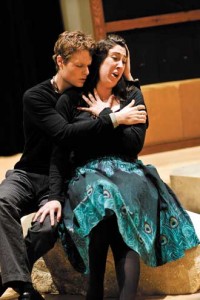
By Chris Chipello
Staging an opera is no simple matter. Elaborate costumes and sets must be designed and produced, orchestras must hone their timing, singers must master their librettos.
Very few universities manage to do all this as reliably as McGill, whose Schulich School of Music stages as many as five productions a year – including an annual baroque opera, complete with period instruments.
This year’s biggest opera, Benjamin Britten’s The Rape of Lucretia, will be performed Jan. 28, 30 and 31 at Pollack Hall, with the McGill Symphony Orchestra led by conductor Julian Wachner.
It is the fifth McGill production for Director of Opera Studies Patrick Hansen, now in his second year here. Hansen previously was director of artistic administration at the Florida Grand Opera in Miami; before that, he directed the young-artist program at Glimmerglass Opera in Cooperstown, N.Y., which provides experience for singers at the beginning of their professional careers.
At McGill, “I’m lucky to have fallen into a team that was already here,” said Hansen, ticking off other key collaborators: set designer Vincent Lefèvre; costume designer Ginette Grenier and Schulich lighting designer Serge Filiatrault.
Starring in the productions, of course, are the student artists. Lucretia – a tale set in Rome around 510 BC – features eight singers, with Master’s student Liliana Piazza playing the title role.
Of Schulich’s 850 students, about 100 specialize in voice. Of those, about 20 undergraduates and 20 graduate students are enrolled in Opera McGill.
The craft of opera performance goes well beyond mastering vocal techniques. McGill Opera students get training in movement, and in acting for regular theatre. Many also study German, Italian, or both.
“The aesthetic of opera has certainly changed in the last decade,” said Hansen. “The people who are making careers are people who are adept with their acting technique as well as with their singing technique.”
Opera companies now expect performers to be versatile enough to handle musical theatre, since some produce works such as Stephen Sondheim’s Sweeney Todd as opera. And opera singers “are finding a lot of work on Broadway, because many of the scores that are coming out – particularly the chorus parts” – require singers with “legitimate techniques” and range, especially at the high and low ends of the spectrum.
For Master’s students, in particular, it’s important to develop a career plan, Hansen stresses. Only a few McGill graduates go on to careers as opera performers. For those who don’t make it as singers, he notes, there are other potential career paths in the business – in roles such as marketing, administration or casting agent.
Hansen fell into opera while studying piano as an undergraduate at Simpson College in his native Iowa. He followed his then-girlfriend (now his wife) to the Julliard School in New York, where he worked as a vocal coach and accompanist. Later, he served as a rehearsal pianist for the chorus of the Lyric Opera of Chicago.
He and Wachner chose
The Rape of Lucretia for this month’s production partly because most of Britten’s works “are perfect for students,” Hansen said. “He knew how to write for the voice. It challenges them musically … and we had students that we thought would be really good” in this work. “I try to build the season around the students.”
